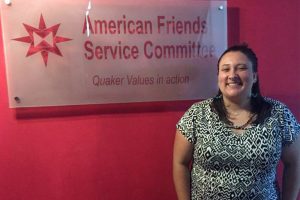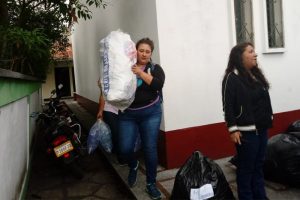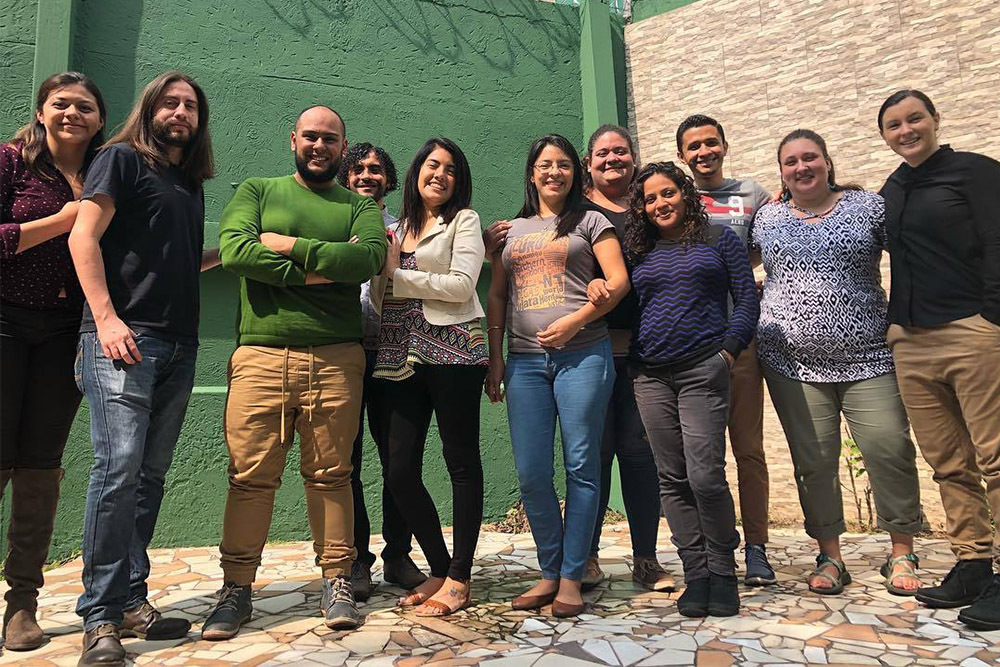Elizabeth Witmer, a senior social work major at Eastern Mennonite University, returned to the country of her childhood for a summer practicum experience. “I was a missionary kid in Guatemala growing up and I’m always looking for opportunities and excuses to go back,” she said.
She tapped into those long-term connections with Mennonite Central Committee (MCC) to help her set up a placement with American Friends Service Committee (AFSC) in Guatemala City. Her research there has focused mainly on immigration and repatriation.
EMU social work majors are required to complete a practicum. Learn more about the major.
When Volcán Fuego, located about 100 miles from where Witmer was living in Guatemala City, erupted at the beginning of June, Witmer grieved with her community for the hundreds of dead and missing. The AFSC office, as well as MCC, raised money and donated equipment for first responders and supplies for survivors. Witmer helped the local Mennonite church deliver supplies to shelters housing area refugees.
With her current research lens, Witmer says the natural disaster is likely to “cause more internal displacement and migration.”

Why did you choose this particular practicum placement?
I was attracted to AFSC because of their global social justice work. I especially felt attracted to their Latin America and Caribbean (LAC) branch because their main work relates to peacebuilding and human mobility. I was excited about working with AFSC LAC’s Human Mobility program because they do a lot of work at the national and regional level, and I have always been the most attracted to meso and macro social work. Plus, working with the immigrant and refugee population is perhaps one of the things I am most passionate about, especially when it comes to engaging systems and root causes.
What the main focus of your practicum work?
Because AFSC LAC works at more of a national and regional level with this program, my practicum has not been the traditional experience of meeting with and documenting interactions with clients every day.
I have focused on researching immigration patterns and the repatriation process for unaccompanied migrant children in Guatemala and Latin America. This focus on research has been especially helpful, not only for my final analysis, but for my own learning and credibility as I work in a country whose processes and policies are not as familiar to me.
This research has included a lot of delving in to academic and government resources, as well as meeting with various community and government organizations. I have met with several human rights watch organizations such as CIPRODENI, which focuses on migrant children rights; several civil society organizations, including one that has the only shelter specifically for unaccompanied migrant children in Guatemala City; and Guatemala’s secretary of social welfare, who is responsible for the repatriation of deported children within the first 72 hours of their deportation to Guatemala.
I have not been involved a lot of one-on-one work with migrants, though I had the sobering experience of spending the day at the shelter for unaccompanied migrant children, where the reason and necessity for my research (and any research related to immigration patterns and migrant rights) was reinforced. At the end of my practicum, my final analysis of the repatriation process of unaccompanied migrant children will hopefully aid and benefit the continued work of those in the Human Mobility program.
Can you share a memorable experience from the summer?
My trip to the shelter for unaccompanied migrant children was by far the most meaningful, heartbreaking and distinctive experience I had during my practicum. There I met children deported from Mexico and the U.S. primarily, children with origins throughout Central America, South America and the Caribbean.
I’ve written more about this in a Facebook post, which was also published in Spanish in a Guatemalan news blog, Nómada:
[I realized] that for all of the years I’ve spent studying immigration, interacting with the migrant community and raging against unjust immigration policies, I know pretty much nothing compared to these 7- and 8-year-olds who have endured the migrant journey. By themselves. And yep, you’re right to assume that no, they probably didn’t do that for fun or because they were itching to break the law. Their lives literally depended (and continue to depend) on it.
Can you share about being in Guatemala during the June Volcán Fuego eruption?

Volcán Fuego, located about 100 miles from where I lived in Guatemala City, left hundreds dead and even more missing. Other than the ash on the streets on my way to work and slightly more difficult respiration right after the eruption, most of us in the city were fortunate not to have been directly affected. The AFSC LAC office in Guatemala City contributed to rescue and relief efforts by raising money and donating equipment for first responders. MCC and the Mennonite church here in the city also became a collection center.
One Saturday, I went with a group from the church to deliver supplies to the shelters near the volcano that are housing those who survived the eruption. [View photos.]
In more general terms, it is probable that the destruction of entire towns caused by the eruption has and will cause more internal displacement and migration.
How did the social work curriculum and coursework offered at EMU prepared you for this experience?
The required Social Work Practice 1, 2 and 3 courses – focusing on micro, meso and macro social work, respectively – really helped prepare me for my practicum in this particular context. Those courses provided a broader perspective of what social work is, the populations social workers can work with, and the level and type of work we can choose to focus on.
Additionally, the opportunity to take classes in other field areas – such as globalization and justice, immigration issues and theories of social change, to name just a few peacebuilding and Spanish language and culture classes – have given me a broader perspective and more knowledge and experiences to draw from.
What are your post-graduation plans?
For the near future, I will be continuing as the office coordinator at the Intensive English Program at EMU, which is a beautiful community of immigrants, refugees and international students. Eventually I plan to go to graduate school.

The IEP is the most immediate beneficiary of Elizabeth’s summer internship. Elizabeth uses her social work skills and mind-set to make the IEP a better place and to enhance the international and immigrant/refugee students’ experience at EMU.
Not only she is a social worker but more importantly she has a pure heart. She is a loving person who I’d say have impacted many IEP students’s lives by being as friendly as professional. I was blessed to get to hang out with her and hear from her experience in Guatemala.
Keep it up Elizabeth